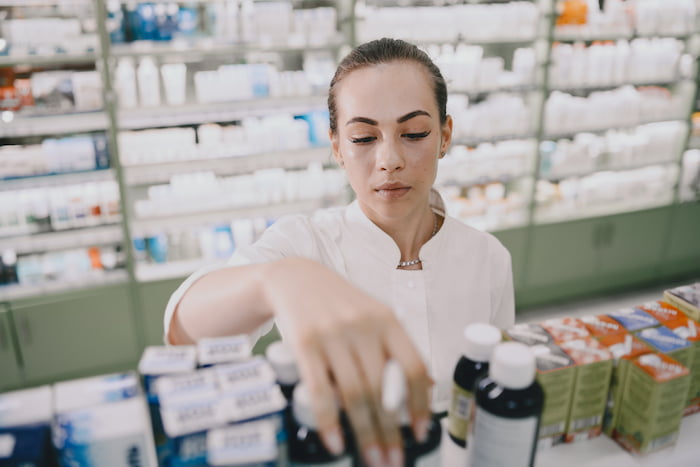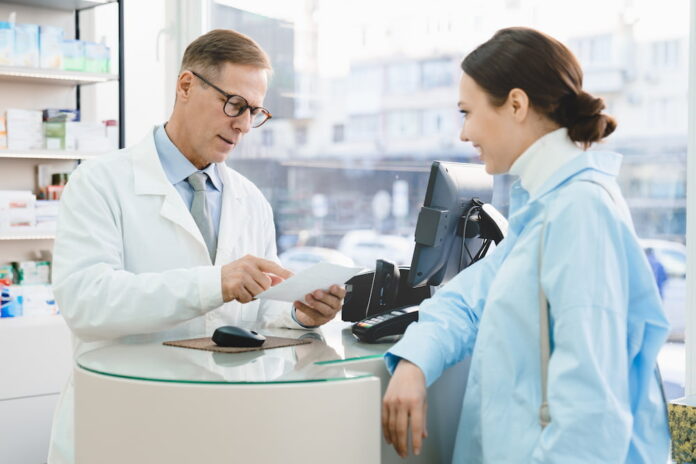Who’s the first person that comes to mind when you need to ask a question about medications? For most people, that person is a doctor. While physicians do have adequate knowledge of all types of drugs, pharmacists can also help you if you need any advice on how to use a particular medication, how it interacts with other drugs and other important questions we’ve covered in this article.
It may surprise you, but pharmacists may even assist you more if you need personalized answers about the medications you’re taking. That said, the first step is to know what to ask your pharmacist once you start taking a new prescription. You may believe that the medication label holds all the answers. However, these are often hard to understand and can’t answer more specific, personalized questions.
Pharmacists have studied all types of drug interactions, side effects, etc. And asking the right question can prevent many problems that could otherwise happen in the future. That said, here are 12 essential questions to ask your pharmacist.
1. What Does This Medication Do?
Some drugs, such as antibiotics, are made to help fight bacterial infections. Others are used to help with colds or relieve pain. Essentially, you should know how a medication affects your body to understand whether it’s working for you or not.
Skilled pharmacists, like those from the Everest Whole Health Pharmacy, will always know such information and will be glad to share it with you. So, don’t hesitate to ask them.
2. Is There a Generic Version of My Prescribed Medicine?

If your drugs are too expensive for you, there may be a cheaper option that could save you hundreds of dollars in the long run. You can ask your pharmacist whether there’s a generic version of the drug you’re taking.
But what’s the difference between a brand-name and a generic medication? The only difference is in their price – generic drugs are considerably cheaper than their brand-name counterparts while containing the same active ingredients and having equal restorative outcomes.
That said, asking your pharmacist about generic alternatives to the brand-name drugs you’re taking may help you save some money you’d otherwise unnecessarily spend.
3. Are There Any Side-Effects to This Medication?
When taking a particular drug, it’s vital to know its potential side effects. However, the list of potential side effects can be long, so you may want to ask your pharmacist to educate you about the most common and dangerous ones and how to handle them.
It’s a good idea to also ask whether there are certain instructions to adhere to prevent any side effects. If the side effects of the medication you’re currently using are too much to bear, is there any alternative you could try?
Getting answers to such questions will boost your knowledge of the drugs you’re taking, assisting you in taking better care of yourself.
4. Is There Any Written Information About This Drug You Can Take with You?
Apart from the regular labels, the manufacturer or even your pharmacy may offer extra materials about your medication that hold information written in a way that’s easier to comprehend than the insert found in your drug packaging.
5. How Should You Take Your Meds?
There’s a right way to take your medication and many wrong ways to do so. If you want to increase the effectiveness of your drug or prevent any problems, ask your pharmacist what the proper way to take that particular medication is.
Don’t be afraid to ask some more specific questions like whether you should take it with, before, or after a meal and whether you should take it in the morning or evening. If you’re taking any other medicine, make sure to ask whether it’s wise to use this one along with the others.
You need to know whether there’s something you should avoid when taking this drug, how long you need to take it, and how much time that medication takes to work. So, don’t hesitate to ask those questions too.
6. What if You Forget to Take Your Medicine?

Patients commonly forget to take their medication. While missing a dose may not seem disastrous, it may reduce the drug’s effectiveness. For this reason, asking your pharmacist what to do in such a case is vital.
Read Also
- The Future of Men’s Health: Why Telehealth Is Here to StayTelehealth isn’t just a pandemic trend that faded into the background. For Australian men, it has become one of the most practical, time-saving, and stress-free ways to manage everyday health — and it’s shaping the future of how we access care. Platforms like DOCTO, an Australian online doctor and specialist telehealth service, are leading the… Read more: The Future of Men’s Health: Why Telehealth Is Here to Stay
- How to Build a Simple, Clean Skincare Routine ?You don’t need a complicated skincare routine. It doesn’t have to be something that requires twenty different products and confusing steps. Your routine works well with just a few high-quality clean ingredients. The beauty industry keeps pushing more products, but your skin actually needs less. You only need a simple approach to get better results… Read more: How to Build a Simple, Clean Skincare Routine ?
- How Preventive Dental Care Supports Overall HealthHave you ever wondered how a simple dental checkup could impact your entire body? Oral health is more than just a bright smile. Studies show that poor dental habits can contribute to serious health problems. Gum disease and tooth decay are linked to heart disease, diabetes, and infections. Yet, many people overlook preventive dental care.… Read more: How Preventive Dental Care Supports Overall Health
- Seeing Clearly in a High-Tech World: A Deep Dive into Advanced Vision Care ServicesProtecting your eyesight isn’t optional—it’s essential. Modern eye care has evolved far beyond basic exams, offering advanced diagnostics, personalized treatments, and surgical innovations that keep vision sharp for life. A leading example is Intermountain Eye Center, home to specialists like Dr Fishburn Boise, where patients receive comprehensive, high-level vision care designed to preserve long-term eye… Read more: Seeing Clearly in a High-Tech World: A Deep Dive into Advanced Vision Care Services
- Why the Keto Diet Works for Some People—and Fails Dramatically for Others: An Ayurvedic Breakdown for Modern HealthcareThe keto diet has dominated weight-loss culture for years. For some people, it produces rapid fat loss, stable energy, and improved mental clarity. For others—especially those who gain weight easily—it leads to burnout, digestive distress, rebound weight gain, high cholesterol, and a metabolism that feels slower than before. Healthcare often frames this as a discipline… Read more: Why the Keto Diet Works for Some People—and Fails Dramatically for Others: An Ayurvedic Breakdown for Modern Healthcare
7. Where to Store Your Meds?
It matters where you store your meds because the stability of particular drugs can be affected unless you keep them at the right temperature. Typically, this means a dry and cool place at room temperature.
To protect your medication, make sure to check the information written on its label. Moreover, never leave your drugs in the car. If your meds were exposed to extreme heat, don’t take them before asking your pharmacist what you should do.
Another important reason for storing your medications safely is to prevent their misuse by adolescents who may find them in your medicine cabinet. As you may know, drug misuse can be fatal, and the best and simplest way to avoid that is to store your meds in a safe place where underage individuals can’t reach them.
8. When to Follow Up?
It’s essential to follow up frequently with your pharmacist to update them on your current health status. This way, they can understand what to do next regarding your health, such as increasing or reducing your dose.
9. Are There Any Activities You Should Avoid?
Some medications may reduce your physical and mental abilities and are best to be avoided when taking those particular drugs. For instance, you may not be able to go to the gym, drive, or have sex. That said, it’s vital to be informed about this, and one of the easiest ways to do that is by asking your pharmacist.
10. Is There Any Alternative if You Can’t Swallow Pills?
If you find your pills hard to swallow, ask your pharmacist whether there’s any alternative you can use instead, such as medications in the form of a liquid.
11. Is This Medication Safe for Pregnant or Breastfeeding Women?
Another important question to ask your pharmacist if you’re pregnant or breastfeeding is whether your medication is safe for you and your baby. This also applies if you’re planning to be pregnant in the future.
12. Are There Any Discounts on This Medication?

Like other goods you can buy, medication prices can vary depending on the pharmacy you’re buying it in. There may also be discounts or prescription coupons available on that particular drug you’re using, so don’t hesitate to check with your pharmacist about how you can save some dollars.
Stay Informed for Better Health
Taking care of your health is paramount. That’s especially true if you currently have a certain condition and need to use medications. Taking your meds the way they should be taken is vital to maximize their effectiveness, so don’t hesitate to ask your pharmacist anything you may want to know. They possess immense knowledge of all types of medications and possible interactions with other drugs, vitamins, herbs, etc., and will be glad to help you.
By having the information about the medicine you’re taking, you can take better care of your health, making you feel better and enjoy life more. So, stay informed!






